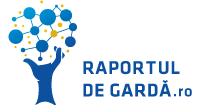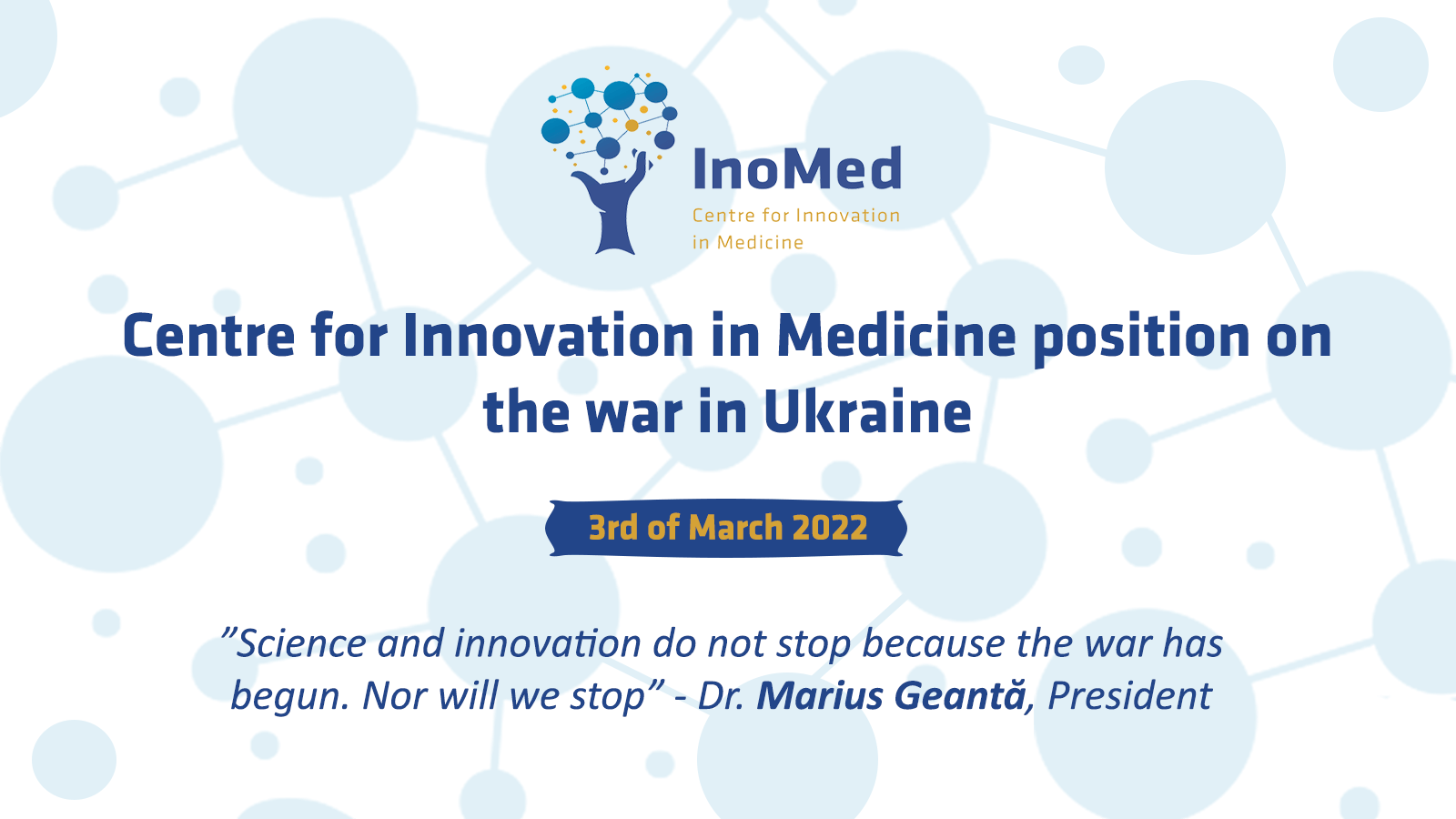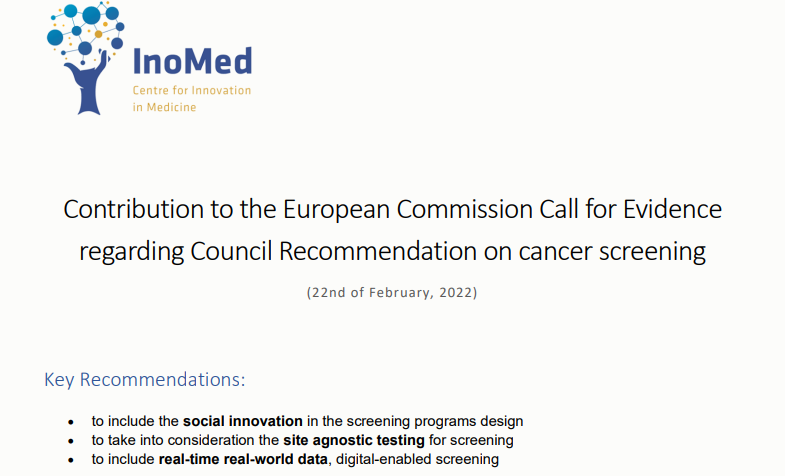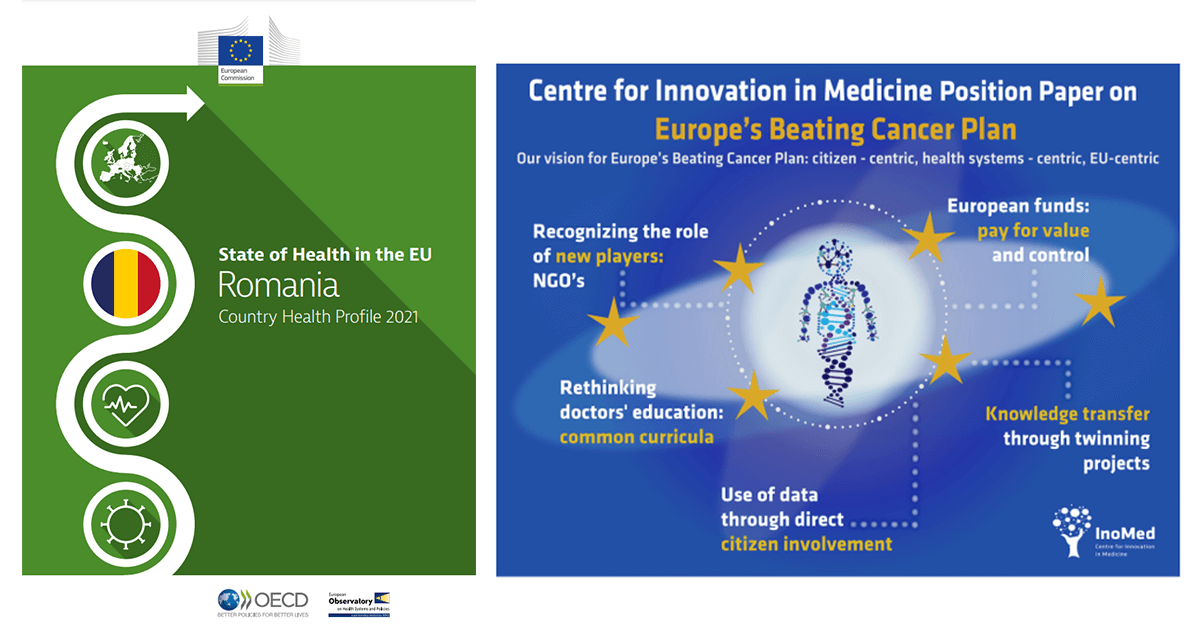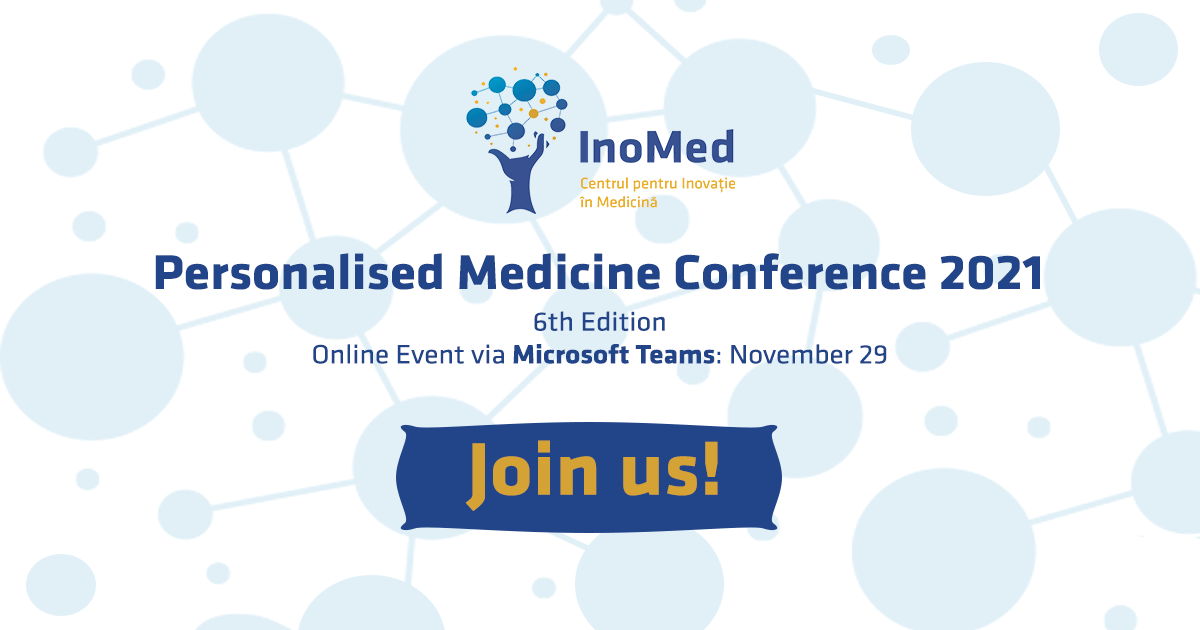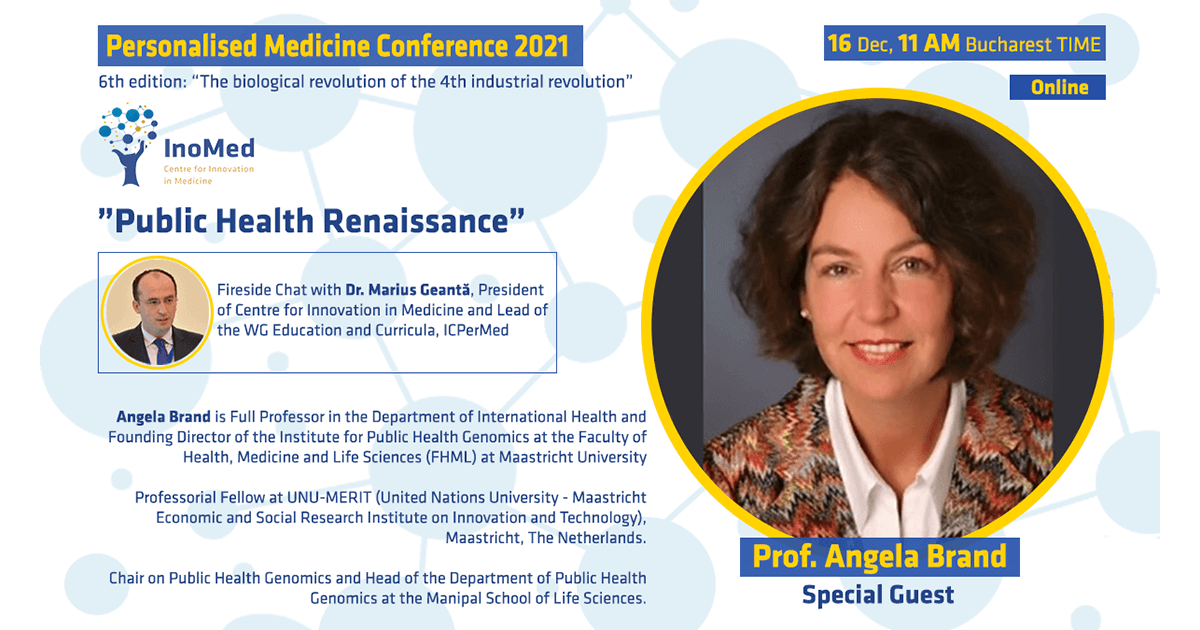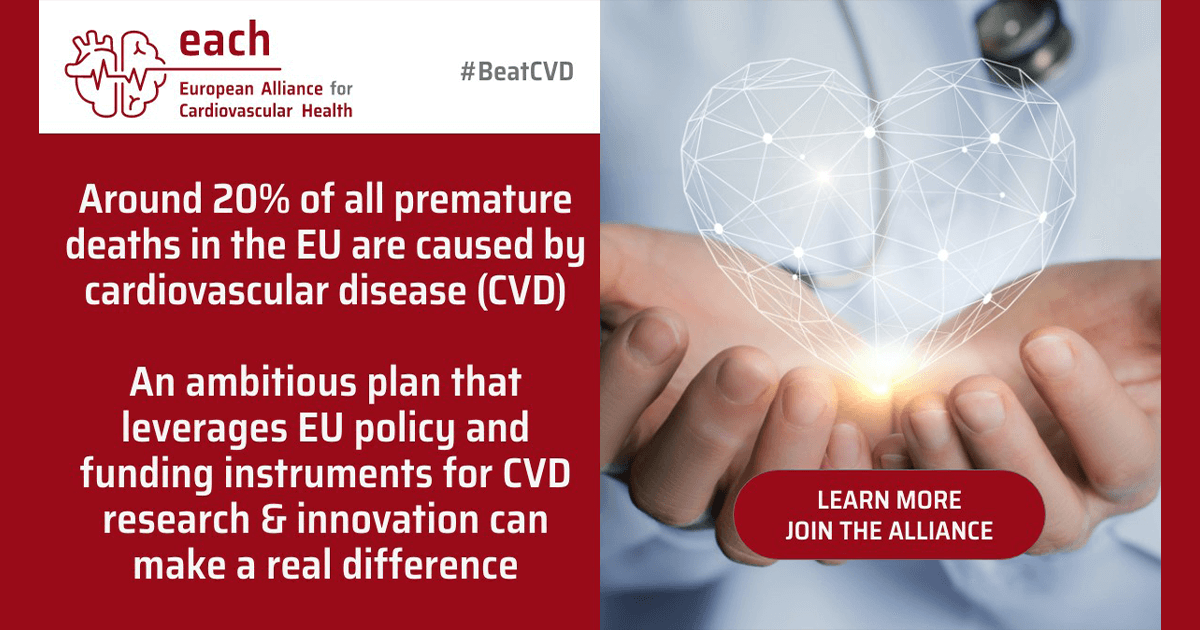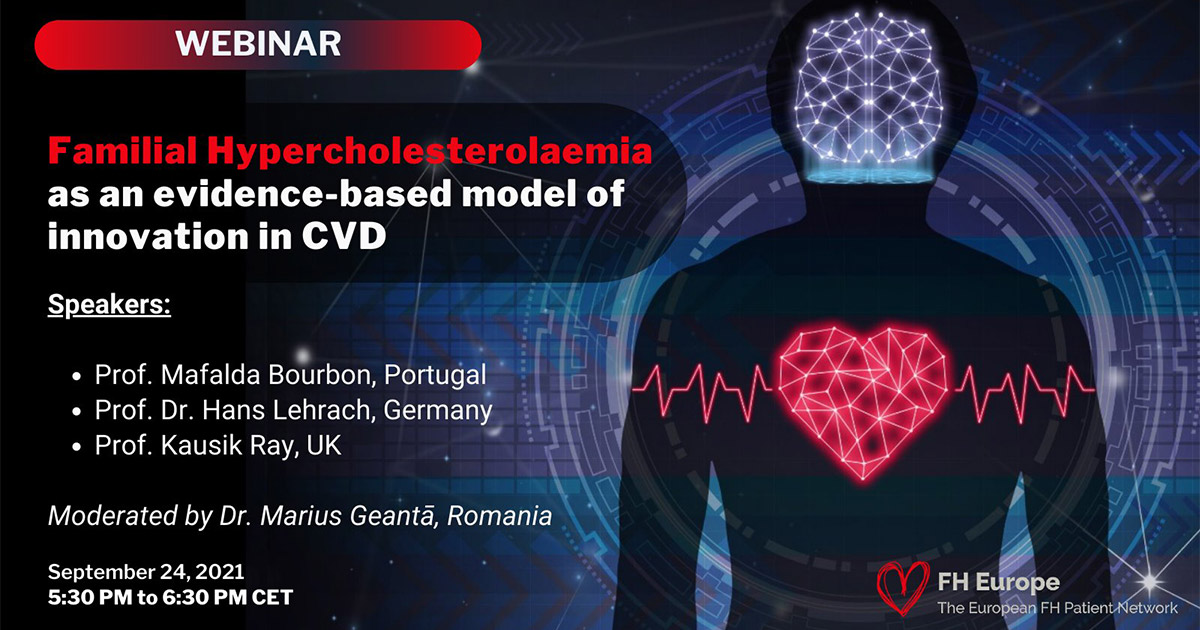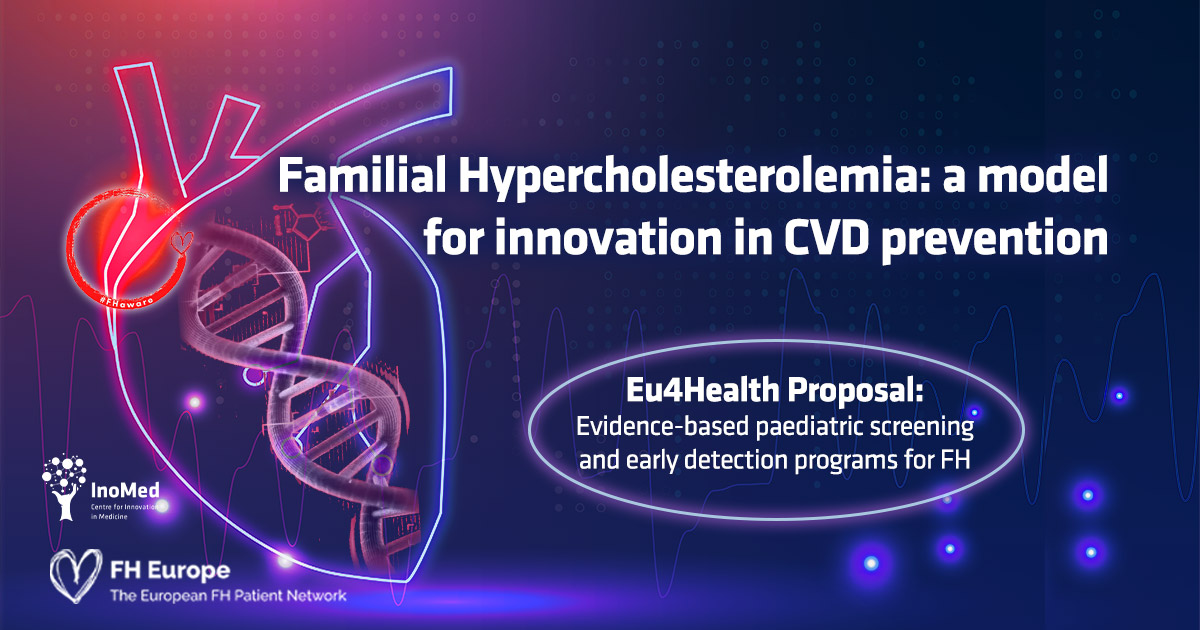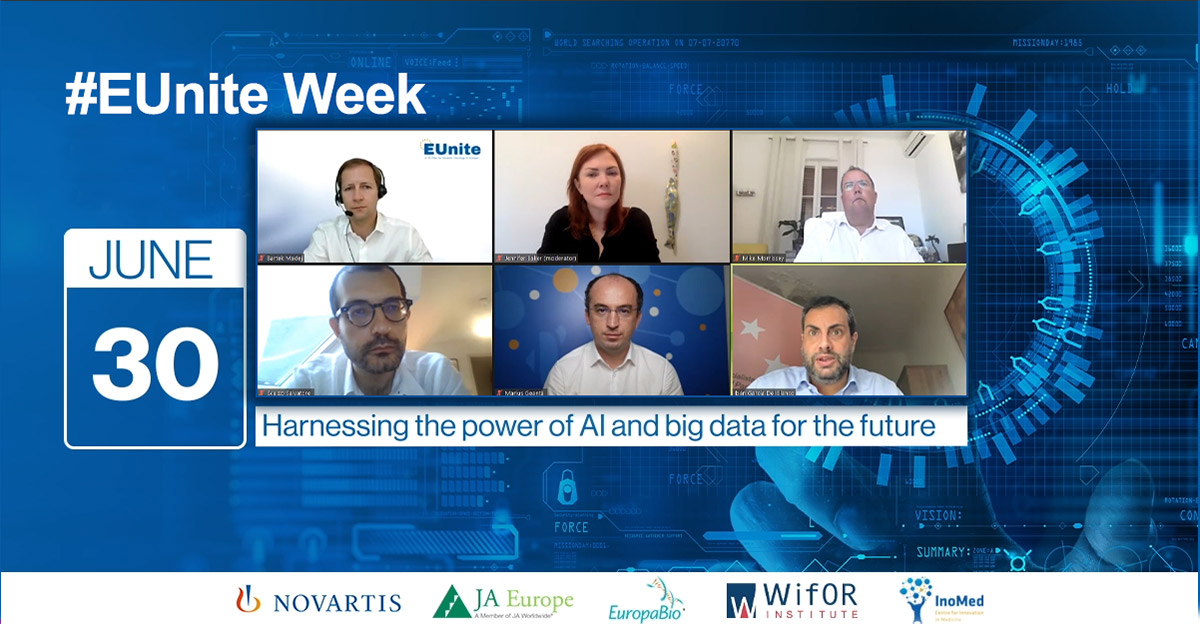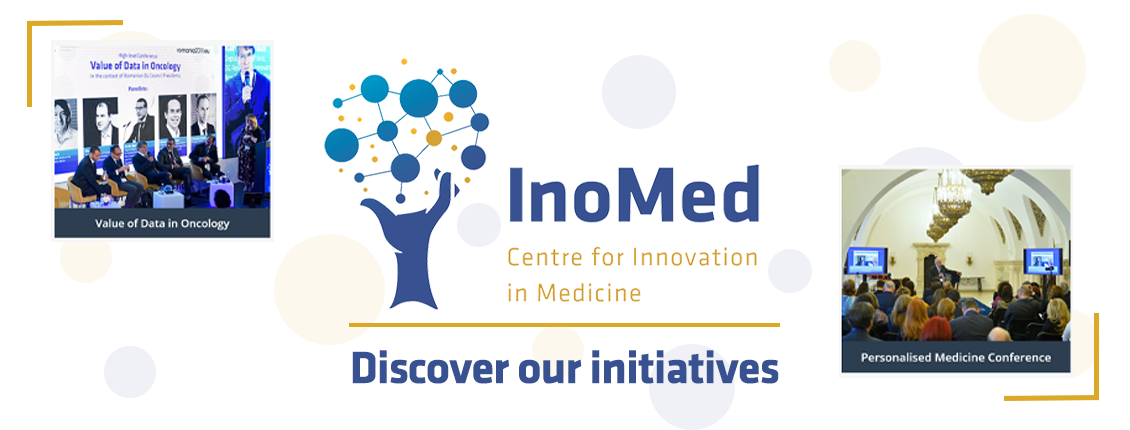 The Centre for Innovation in Medicine is a European research & innovation organization, with interest in innovative health policies and civil society education. The aim of the Center for Innovation in Medicine is to shorten the time between the emergence of innovations and their application for citizens benefit. We develop programs to educate, inform and engage all audiences about innovation in medicine in an attempt to create a friendly environment for early adoption of innovative technologies, ideas, products and services, serving as an independent platform for informed dialogue between all stakeholders in the field of omics medicine, personalised (precision) medicine, digital health, data oncology, immune-oncology, cancer research, biotechnology, systems biology and other hot scientific topics. Read more about our policy papers, here.
The Centre for Innovation in Medicine is a European research & innovation organization, with interest in innovative health policies and civil society education. The aim of the Center for Innovation in Medicine is to shorten the time between the emergence of innovations and their application for citizens benefit. We develop programs to educate, inform and engage all audiences about innovation in medicine in an attempt to create a friendly environment for early adoption of innovative technologies, ideas, products and services, serving as an independent platform for informed dialogue between all stakeholders in the field of omics medicine, personalised (precision) medicine, digital health, data oncology, immune-oncology, cancer research, biotechnology, systems biology and other hot scientific topics. Read more about our policy papers, here.
On 15th of March we sent an Open Letter.
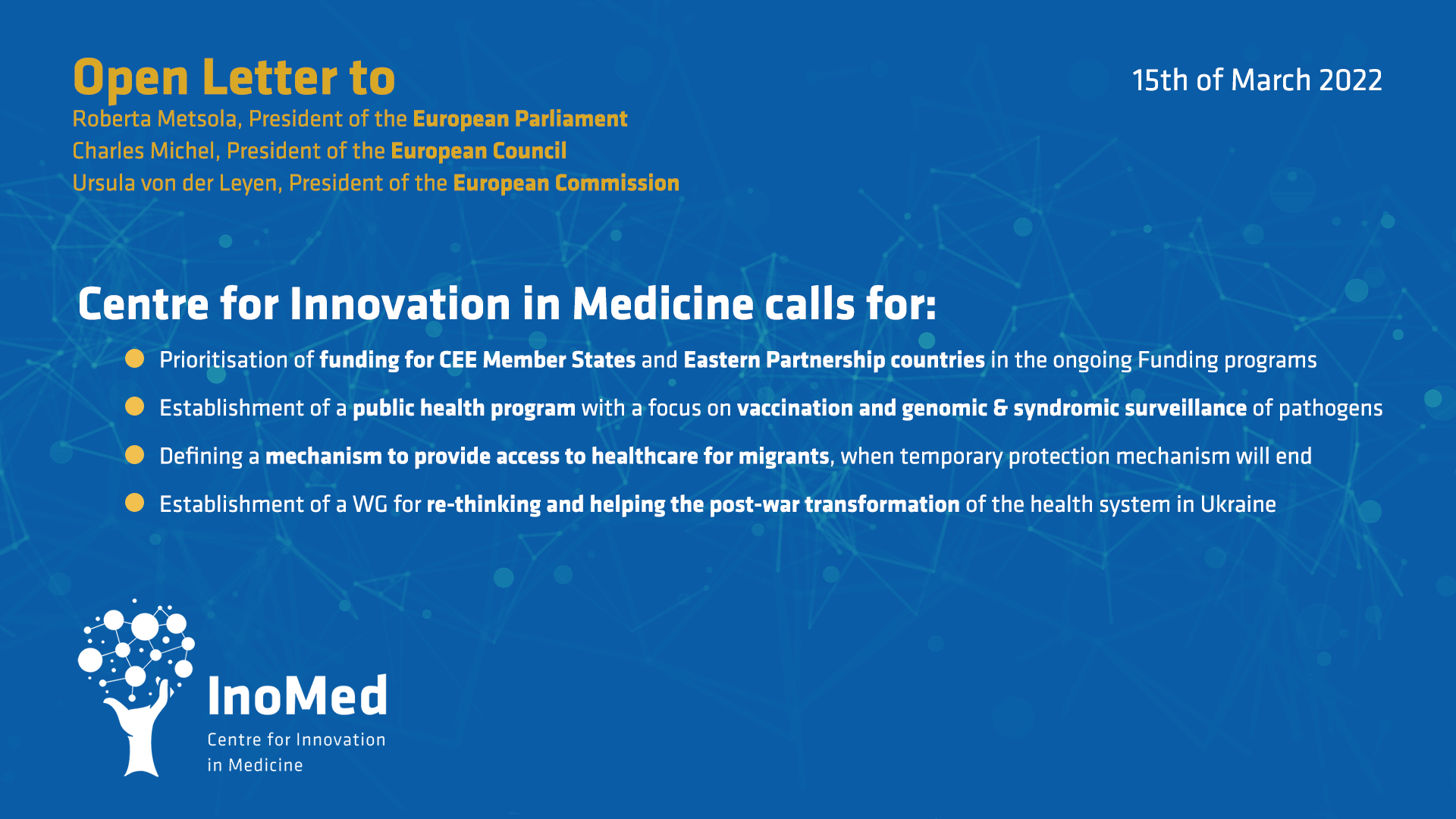
Two weeks later, seven new interns joined us.
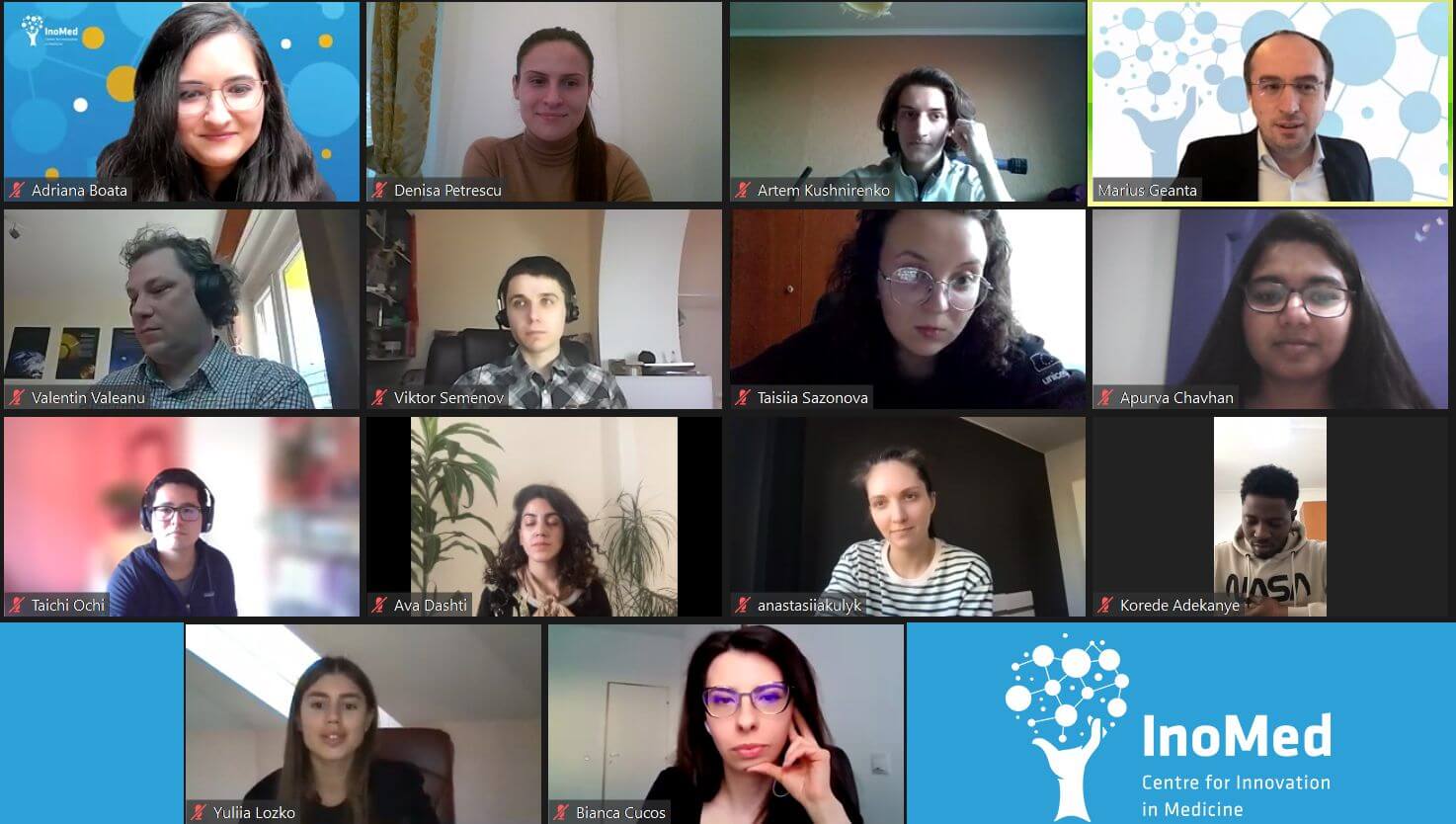
On the 7th of March 2022 we opened six positions.
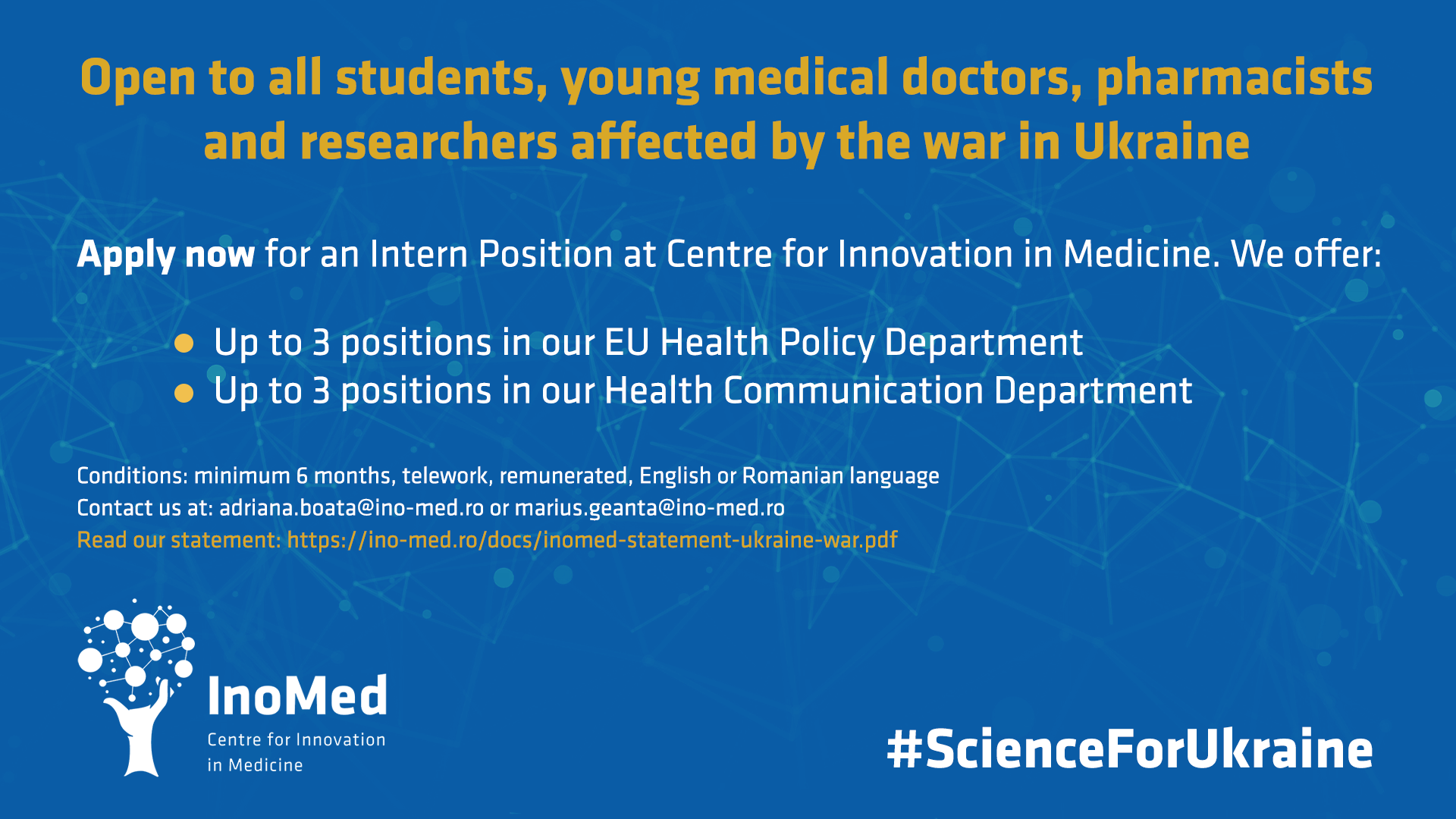
On 7th of February we organized an important policy event. Read the report.
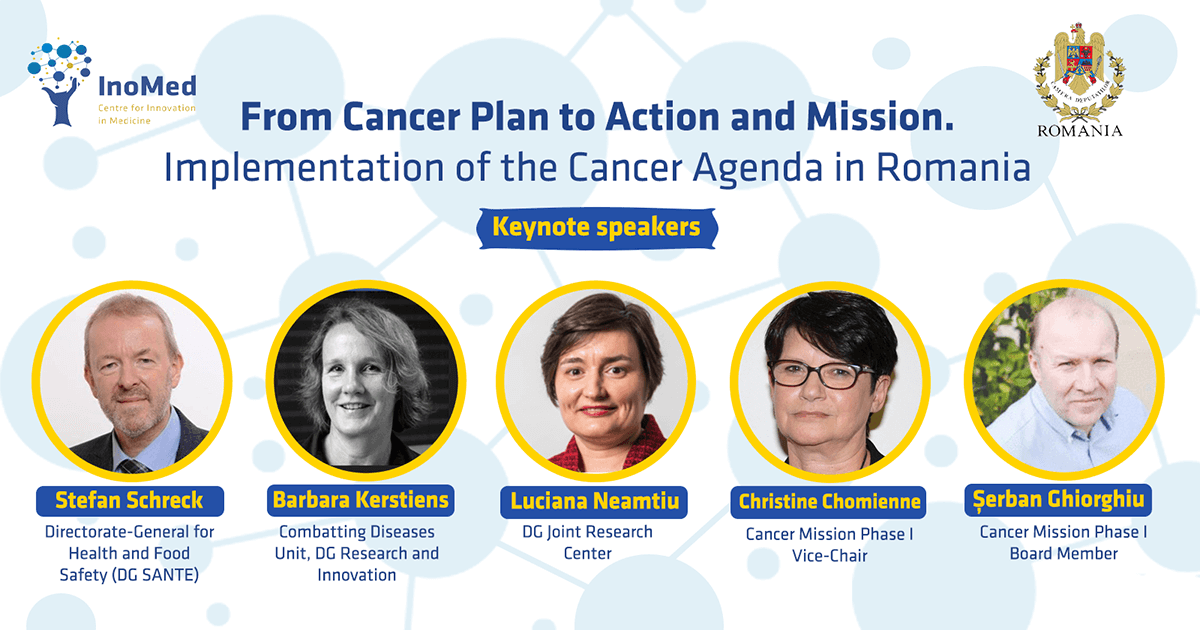
Centre for Innovation in Medicine in 2021:
- In January 2021 we became members of the Inequalities Network of the European Cancer Organization;
- In February 2021 we published our proposal for the establishment of a Genomic Sequencing Surveillance System for SARS-CoV2 in Romania and the establishment of a National Center for Genomic Data and Analysis for Public Health;
- And then we lost track of the dates, but we published the White Paper on Gene Therapies and the White Paper on Cell Therapies;
- And we contributed to the first impact analysis of investments in cancer control in Romania – the first project that aimed to calculate the social impact of cancer in Romania (in collaboration with the Academy of Economic Studies, Bucharest);
- We continued by publishing the Position Paper on Chronic Heart Failure in Romania;
- Followed by the White Paper on biomarker testing in NSCLC and the Position Paper on implementation of NTRK testing in Romania – both documents were aligned with the goal of implementing Personalized Medicine in the Romanian healthcare system by including it as a general objective in the Romanian Cancer Control Plan;
- In May, we organized a high-level event on Health Literacy in Romania and launched the Romanian Coalition for Health Literacy;
- Then, in June 2021, we joined the Novartis EUnite4Health Ecosystem Team;
- July came and the “Thanatechnology and the Living Dead: New Concepts in Digital Transformation and Human-Computer Interaction” was published – a concept we also contributed to;
- In September 2021 we contributed to the Launch of “Time to Act” campaign in Romania;
- But the autumn was not over and we transformed it into a Personalized Prevention Autumn: On September 10th, DG SANTE organized a webinar on the priorities, strategic orientations and the needs to be addressed through the EU4Health annual work programmes – Dr. Marius Geantă, our President, on behalf of FH Europe, presented a proposal on the implementation of evidence-based paediatric screening and early detection programs for FH at the EU level;
- Two weeks later, during the Launch of the European Alliance for Cardiovascular Health – September, 27, Dr. Marius Geantă, Co-chair of Scientific and Public Health Advisory Group, FH Europe, clearly answered the question ”What is the Alliance asking for?”;
- As October came, we did not forget about our engagement to cancer inequalities and during the Global Health Literacy Summit 2021, we presented: “Cancer literacy, a key element of the EU Cancer Plan: Perceptions and attitudes towards cancer prevention, diagnosis and treatment in Romania”;
- Nor did we forget about our long engagement with Health Literacy, and during the same Summit, we published our first steps on the development of a Health Literacy Action Plan in Romania;
- The 11th of October came and during the event ”Achieving Equity and Innovation in Newborn Screening and Family Hypercholesterolemia Pediatric Screening Across Europe”, our voice was heard again and Dr. Marius Geantă described the need for innovation in cardiovascular disease management and how familial hypercholesterolemia can be a model in this regard;
- November and another milestone – ICPerMed (International Consortium for Personalised Medicine) Family Meeting. Dr. Marius Geanta led the “Education and Literary – Identification of future activities to empower health care providers, patients and citizens” session;
- No time to catch our breath because inequalities in HPV vaccination are still here, in the CEE countries. So in collaboration with the Renașterea Foundation and the Romanian Parliament, on December 9th, we organized the health policy event of the year in Romania – “Elimination of cervical cancer in Romania: vaccination, screening, diagnosis, treatment”;
- On 15th of December we kept talking about inequalities in cancer care, in collaboration with Vital Transformation, during the online webinar: “Cancer Inequalities between and within member states”;
- Looked like the end of the year was silently approaching, but we still had some time to organize the 6th edition of our Personalised Medicine Conference. And it was on fire: Prof. Angela Brand, Dr. Angelique Coetzee, Dr. Vinod Scaria discussed the importance of viral surveillance. They were followed by a panel with the Romanian key opinion leaders on Personalised Medicine in the Romanian Cancer Control Plan.
- By the end of the year, we were preparing to publish our results on the first Budget Impact Study on Biomarker Testing in NSCLC (non-small lung cancer) – in collaboration with the Academy of Economic Studies, Bucharest;
- And the “State of the Health in Romania” Report was published – the result of a collaboration between the OECD, the European Observatory on Health Systems and Policies and the European Commission. Our Position Paper on Europe’s Beating Cancer Plan was cited as a reference for the innovative vision on the implementation of the EU Cancer Plan in Romania;
- All these while on our innovation communication platform – Raportuldegarda.ro (in Romanian) – we delivered (weekly) the most important information for combating the Covid-19 pandemic and disseminate it through our President’s voice on the Romanian Radio and Television, and overall, brought to our Romanian readers daily news on innovation at the European and international level.
Just wait and see what’s next!
The European Cancer Plan represents an unprecedented opportunity for countries like Romania. The Position Paper launched by the Centre for Innovation in Medicine in May 2020 is cited in the Report because of its Innovative Vision on how the European Cancer Plan should improve cancer management in Romania, while reducing inequalities between and within Member States.
On December 16th, the Centre for Innovation in Medicine organized the 6th edition of its annual Personalised Medicine Conference. The theme of the event was The biological revolution of the Fourth Industrial Revolution. The first session was dedicated to “ Genomic advances that made a difference in the pandemic and best practices in viral surveillance”.
The event started with a Fireside Chat with Dr. Marius Geanta, President of the Center for Innovation in Medicine, and his special guest, Prof. Angela Brand, from the Maastricht Economic and Social Research Institute on Innovation and Technology, Maastricht University, The Netherlands.
“Surveillance has always been a key task of public health, at the European and local level. The messages did not change at all. During the pandemic we learnt to apply digital tools faster, we can now use real-world evidence and make predictions with high certainty. We were already talking about syndromic surveillance. The next step is to include individual genomic information, underlying pathways, and patterns to explain why people have different severities of COVID-19, why fatality rates are different, why drug treatment and responses are different. Not only between continents, but between individuals. It isimportant to do population-based genomic sequencing” – Prof. Brand
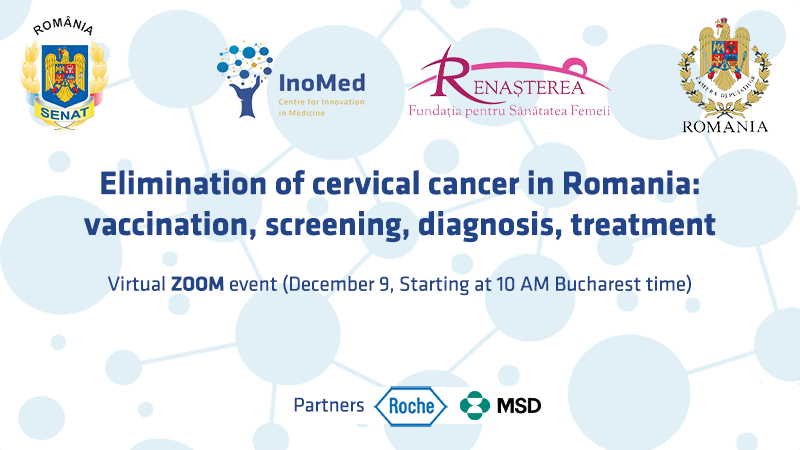
The Center for Innovation in Medicine and Renașterea Foundation, in collaboration with the Romanian Parliament, organized on December 9, starting with 9 o’clock CET, the online event “Elimination of cervical cancer in Romania: vaccination, screening, diagnosis, treatment”. More details, here.
The event ”Achieving Equity and Innovation in Newborn Screening and Family Hypercholesterolemia Pediatric Screening Across Europe” took place on October, 11 in virtual format and brought together representatives of the Slovenian authorities, representatives of the European Parliament and the European Commission, as well as civil society and patients. Dr. Marius Geantă, President of the Center for Innovation in Medicine and Co-Chair of the FH Europe Scientific and Public Health Advisory Group, spoke at the event about the need for innovation in cardiovascular disease management and how family hypercholesterolemia can be a model in this regard: “Talking about innovation is an obligation, a duty, a mission and it is the only acceptable way to move forward.”
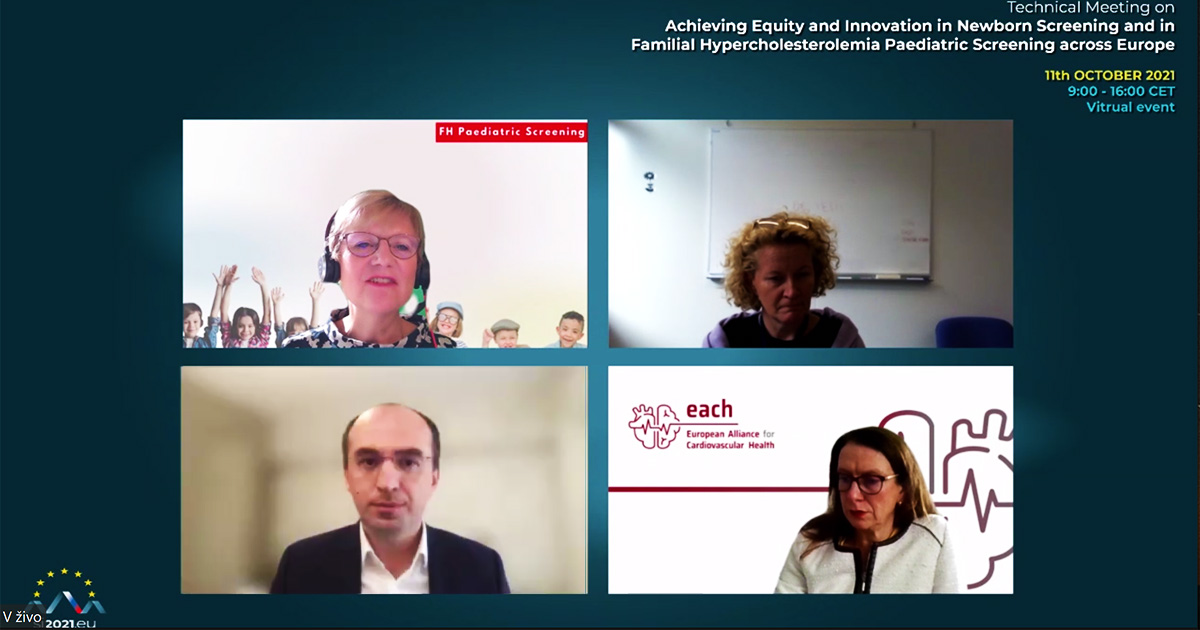
“To date, the EU focused heavily on combating cardiovascular disease as a lifestyle disorder. CVDs are perceived as a consequence of unhealthy diets, lack of physical activity or exposure to certain environmental factors. Although these factors are important, it should be clear that many cardiovascular diseases cannot be prevented. They are inherited or congenital, or occur due to functional decline or are the result of other chronic conditions or therapies.
For example, familial hypercholesterolemia (HF) is a common, life-threatening genetic condition that, if left untreated, can lead to early myocardial infarction. So the EU should not just focus on primary prevention. And it could start by taking a more holistic approach and by proposing solutions throughout the disease, from personalized prevention, early detection and screening, and access to care and treatment, to improved rehabilitation and care after illness.
The EU should also support the use of innovation to prevent cases of myocardial infarction and stroke that can be prevented by personalized prevention. And I think FH could be a role model for that. Today’s meeting could certainly be a huge step for European citizens and patients.”
On September 10th, DG SANTE organized a webinar on the priorities, strategic orientations and the needs to be addressed through the EU4Health annual work programmes, building on the outcomes of the targeted consultation organized during the summer of 2021.
Disease prevention and health promotion represent the most urgent needs to be addressed in the next programming of EU4Health, starting with 2022, according to the inputs from diverse stakeholders (NGOs, associations, businesses, Member States’ policymakers, patients’ organizations).
Around 20% of all premature deaths (below the age of 65) in the EU are caused by CVD. CVDs are caused by so-called modifiable or non-modifiable (inherited, genetic) risk factors. The world’s most common and non-modifiable CVD risk factor is Familial Hypercholesterolemia (FH). Less than 10% of those born with FH, are diagnosed and adequately treated, leading to heart attacks, strokes, heart disease and deaths, early in life, even as early as 4 years of age.
During the webinar, Dr. Marius Geantă, President of the Centre for Innovation in Medicine and co-chair of the Scientific and Public Health Advisory Committee at FH Europe, presented a proposal on the implementation of evidence-based paediatric screening and early detection programs for FH at the EU level. More details.
Today (9th of September 2021) The Centre for Innovation in Medicine, as a member of the ECO Inequalities Network, is pleased to announce the launch of “Time to Act” campaign in Romania. Our president, Dr. Marius Geantă is a speaker during the event and a member of the Steering Committee of the Inequalities Network.
- An estimated one million Cancer cases could be undiagnosed in Europe
- An estimated 100 million Cancer screening tests were not performed in Europe during the pandemic, leading to later stage diagnoses and decreased overall survival
- Up to 1 in 2 people with potential cancer symptoms were not urgently referred for diagnosis
- 1 in every 5 cancer patients in Europe is currently still not receiving the surgical or chemotherapy treatment they need
The “Big C” won’t wait for the Covid-19 pandemic to be over and neither should Romania or any European state. Follow this link for all the information about the event.
The message of Dr. Marius Geantă: “Inequalities at EU level are the reason I joined ECO last year. We have reached this point because over time we have continued to do things the same way and, implicitly, if we continue in the same way, in the best case scenario, inequalities will persist. But as innovation develops, inequalities will certainly increase.
- The fight against cancer must be waged by all actors who have something to say in the field of cancer, including the NGOs;
- Financing is not a problem, but we need to know how to spend that money, there must be quality control systems;
- We must also be honest, admit that we have something to learn – the idea of promoting twinning and teaming projects makes a lot of sense;
- The use of data in the European Data Health Space is very important;
- And in order to have access to these innovations, we need to understand them and we need targeted educational projects.”
Marius Geantă, MD, president of Centre for Innovation in Medicine, was a speaker on the 2nd day of the event: “Technology has increased the resolution at the society level. 4K resolution, many times AI-enabled, is the gold standard in many of our daily activities: watching movies, football matches, playing video games, videoconferences and so on. But can we say the same about health, about the health system? Probably not. There are diseases, hospitals, medical specialties, or even cities or countries where health or medicine could not be considered yet as high definition or 4K medicine/health. The data either does not exist, is not collected and integrated, or is used sub-optimally, or is used incorrectly or is impossible to use. An analysis of the determinants of health shows us how great the potential of health data and non-biased AI is and how little we use from what data we already produce or could produce, as a society”.
More details, here.
Dr. Marius Geantă is a pioneer in the field of personalised medicine in Romania and Central Eastern Europe. A vast majority of his projects involve precision and personalised medicine in oncology. His joining of the FH Europe – The European FH Patient Network comes at a time when the scientific knowledge accumulated until present facilitates the application of prevention in cardiology through genetic testing programs. And Familial Hypercholesterolemia has the potential to become the engine that drives these efforts forward.
Innovation must be a factor that unites the Eastern and Western Europe by reducing the inequalities between member states when it comes to prevention, screening, early diagnosis, treatment or palliative care.
Levels of health inequality between countries and regions with respect to cancer prevention, control, access to treatment and survival can no longer be ignored. Inequalities also occur within countries, between regions, and between social groups.
The Centre for Innovation in Medicine organised the fifth edition of the Conference on Personalised Medicine. It took place virtually via Zoom. The Conference was planned in the context of the European Biotechnology Week 2020. EuropaBio was the event partner. The event gathered representatives of the authorities, academia, professional societies, patient associations and industry. Our main sessions evolved around discussions on building resilient healthcare systems.
